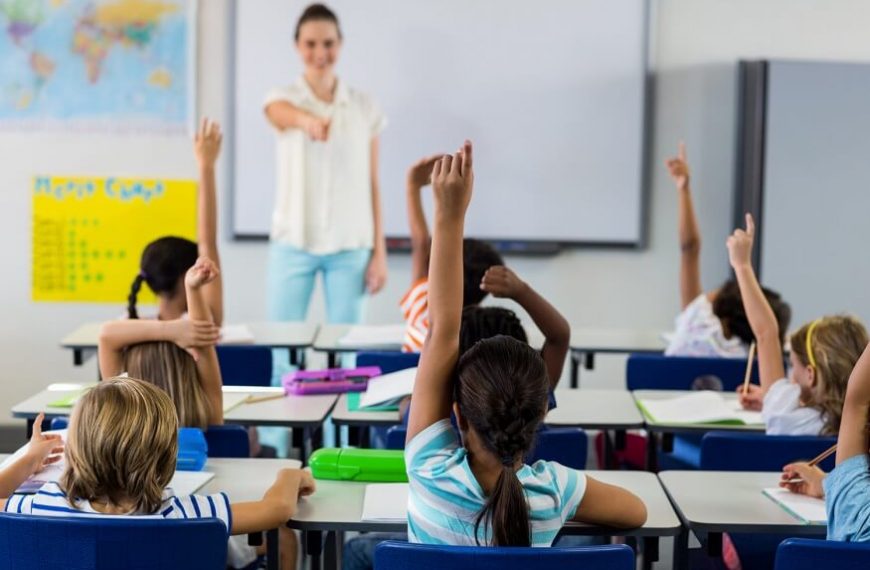If you are wondering what pedagogy is in education, it’s pretty simple! When you have a class of students listening to you and you want the information that you are imparting to stay with them, pedagogy is the solution. Pedagogy encompasses both the art and science of teaching and includes the techniques and strategies used to facilitate learning. It’s all about boosting the engagement, curiosity, excitement and growth of the child by creating a conducive environment through innovative methods. It’s what separates an ordinary teacher from an exceptional teacher.
Effective pedagogy is knowing and understanding that each child is unique with different needs and learning styles and adapting your teaching accordingly. It involves active learning through problem solving exercises, group discussions and hands-on activities. It’s thinking outside the box and can involve the use of music, technology, art or interactive games. Effective pedagogy creates an environment where your students can reach their full potential and for that a teacher needs to make their classes productive, engaging and fun.
Characteristics of Pedagogy
As a teacher, apart from an innovative classroom environment, the main characteristics of pedagogy to consider in your classroom are psychological approaches to learning, educational principles and practices and high-order thinking skills.
The importance of pedagogy in education is paramount as your pedagogical skills have a great impact on the academic achievement of both students who struggle and outstanding students. They also help you to assess your teaching strategies and methods and create expert students even in the most challenging topics.
What are the Pedagogical Approaches
For effective pedagogy in teaching, it’s essential for the core components of pedagogy to be present. This makes it important to know and understand what are the pedagogical approaches that teachers can use in their classroom.
- Constructivist Approach
- Collaborative Approach
- Integrative Approach
- Reflective Approach
- Learning Through Inquiry
In this pedagogy approach, students are involved in the curriculum creation process and thus absorb information quicker. They are an active part of the educational process of gaining and understanding knowledge in a familiar and comfortable environment. This approach enhances critical thinking in students.
In this approach, like-minded students form a group to learn together. They make projects together, form strategies, brainstorm new ideas and solve problems together. This pedagogy approach promotes team spirit, peer bonding, intellectual efforts and helps students gain new perceptions.
Integrative approach enables students to connect their learning across horizons. It aims towards understanding of the learning process, dividing problems based on relevance, showing students how lessons can be applied in practical scenarios and making the concepts learnt a part of their normal routines.
This pedagogy approach allows learners to evaluate themselves. Students observe the teachers and activities of other students which helps them understand why they do certain things and its working. This is the best way for self learning and develops analytical skills in students.
In this approach, the teacher not only questions the learner but also creates an environment of exploration and encourages students to challenge and improve themselves. It aims to move from students aimlessly questioning to understanding the concept and then raising questions. This approach gives students the confidence to question things without any hesitation.
Benefits of Pedagogical Skills for Teachers
Pedagogical skills have many benefits for teachers and as a result it benefits students as well.
- Improves Instructional Delivery
- Ensures Collaborative Learning
- Removes Monotonous Teaching
- Personalised Learning Experience
- Develops Critical Thinking
- Assessment Excellence
- Better Teacher and Student Communication
Every student is different and has their own unique learning style and abilities. They also come from diverse backgrounds and for education to be inclusive it requires teachers to use various instructional methods so that the needs of all students are met. Teachers with pedagogical skills know how to adapt their teaching methods and strategies so that every student benefits. It not only enhances the quality of education, a student-centred pedagogy allows students to understand concepts at their own pace and take responsibility for their learning. If a student is not able to understand a concept, the teacher can use a pedagogy suited to the child’s development level and even try something else if it doesn’t work.
Teachers with pedagogical skills understand the importance of cooperation and ensure that every student gets an opportunity to participate. They can ensure collaborative learning through discussions, peer learning and organising group activities. It motivates students to achieve goals by collaborating with other students like them which often enables them to get a new perspective.
Pedagogical skills enable teachers to use visual and tactile aids, drawing illustrations and pragmatic activities that help students to learn beyond traditional teaching methods. Teachers can create a classroom based on the interests and needs of their students through brainstorming, creating interdisciplinary lessons and asking rhetorical questions so that they are eager to learn and progress. Rote learning only helps to an extent but when they are able to apply these lessons to the real world it makes them more creative and analytical in their thinking.
Pedagogical skills help teachers to observe the specific needs of every student individually and adapt their teaching strategies and methods accordingly. Individualised learning helps in the holistic development of students. Students can follow the method of learning that suits them best and understand the subject better.
Students with special needs too can benefit through pedagogical skills as teachers can help them learn through recorded videos and online tutoring.
Pedagogical skills are a great way for teachers to create classes that encourage critical thinking and problem solving skills. By asking thought provoking questions rather than rote learning questions, a student learns how it is relevant in everyday life.
Teachers with pedagogical skills are able to make precise evaluations and assessments of their students. This way, the progress of the student can be assessed and areas where improvement is required can be identified. Questionnaires, formative assessment, peer assessment, performance-based assessments and self-assessment can be used for this purpose.
Teachers and students require constant communication so that there is a better understanding of students and they can be helped according to their needs. It allows teachers to create a curriculum that focuses on a student’s weak areas so that they can learn better.
The importance of pedagogy in education cannot be challenged. The characteristics of pedagogy in education have to be inculcated to greatly improve the quality of the teaching and learning process. It makes classes more interactive and interesting, strengthens collaborative learning and creates a personalised learning experience. Teachers with strong pedagogical skills are able to help students reach their full potential. So, as a teacher if you want to make a real difference to the students in the classroom, pedagogical skills are a must. For more information on this and to keep yourself updated on pedagogy in education, get in touch with the EuroKids website.
















